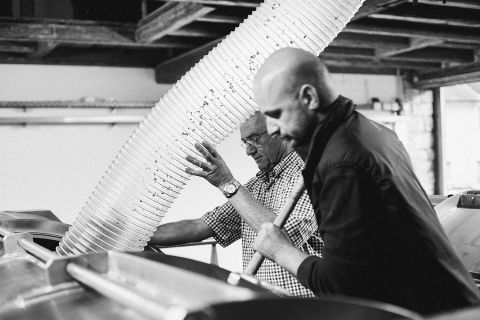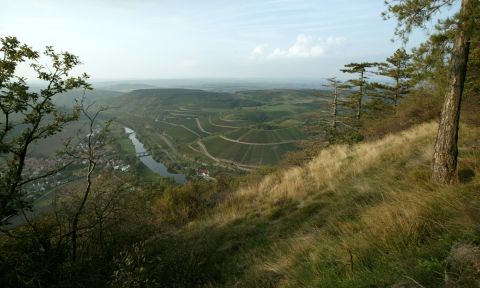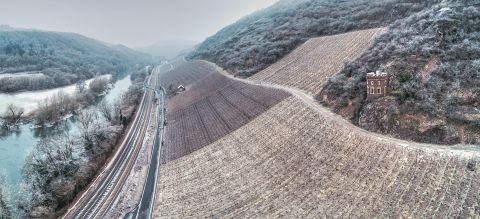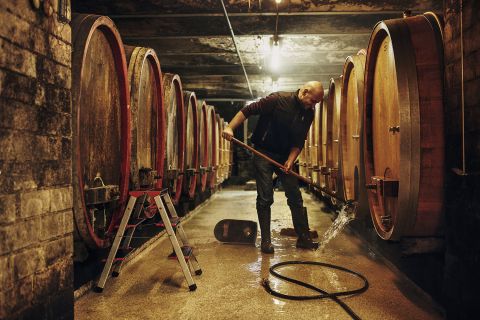Dönnhoff Riesling 2022 Nahe

A classic German Riesling to seduce the naysayers. If you are looking for a lower-alcohol aperitif, a match for succulent seafood or Thai-inspired dishes, or a superior standby for anytime sipping, this fine wine is widely available from €12.24, $18.98, £15.50.
Dönnhoff – the secret weapon of many a floor sommelier looking to indoctrinate you into the cult of Riesling.
‘Don’t tell them it’s Riesling, just drop two tastes with one of the glasses marked, tell them you’ll be right back, and go look busy with another table’, my manager whispered through clenched teeth half a dozen years ago. We were in the middle of a busy service and the dish I had been asked to pair was scallop crudo with white-grapefruit supremes, basil oil and sweet pea microgreens (I remember because it was insanely good). The only glass pour that was going to work with the dish was Dönnhoff Riesling … but the customer in question had said that they did not like Riesling.
As usual, that rule did not apply to Dönnhoff.
It is astounding to me how many non-Riesling drinkers love this wine. Not because it’s not absolutely delicious but because it is absolutely classic. By Helmut Dönnhoff’s own admission, the estate makes the most classic wines they possibly can. When I visited a few years ago he told me, ‘Riesling is not meant to be loud. It is meant to have crystalline pitch and perfect symphony. For me, it is like making classical music. Modern opera is very good, but society needs a benchmark. I wanted to make foundational wines. If you learn the rules, you know I do not break them.’ This wine is a testament to the fact that if you do something well enough, even the sceptics will make exceptions. Fourth-generation Cornelius Dönnhoff, who currently makes the wines, seems to be perfectly in line with his father’s way of thinking.
For the 2022 vintage of Dönnhoff Riesling, the wine strikes an impeccable balance between its off-dry nature, bright mouth-watering acidity, and layered flavours of stone fruit, honeysuckle, salt, mint and bay. At 9.5% alcohol it is dangerously drinkable. Unlike their brethren from the Mosel, Nahe Rieslings are not so overtly floral. This wine is fine-boned and lightweight but with only moderate aromatic intensity.
The estate vineyards span 28 ha (69 acres) and are located in the middle Nahe. This bottling is composed primarily of the family’s Oberhäuser Felsenberg and Kieselberg vineyard sites. Felsenberg is characterised by weathered volcanic soils while Kieselberg has mostly slate, both soil types serving to limit vigour. The vineyards are planted on steep slopes that make hand-harvesting necessary.
Once fruit is brought in, vinification is simple. Helmut Dönnhoff told me, ‘you do as little as possible because every time you touch something you take something away’. Fruit is pressed and juice is transferred to either stainless-steel vat or neutral German-oak stückfass (1,200 litres) from Hösch. This is decided by taste and the facility has enough of both types of vessel to hold the entirety of a year’s production – ensuring that they are able to use the vessel they believe to be in line with the vintage rather than being hemmed in by space limitations. The must then undergoes ambient-yeast fermentation, is racked, matured, lightly filtered and bottled.
These wines are well represented internationally with 60% of the production being exported to 45 different countries! The largest export volumes go to the US, UK, Norway, Spain and Italy. In the UK, Dönnhoff is imported by ABS Wine Agencies.
Image at the top of this article is the author's own; other images were kindly provided by Weingut Dönnhoff.
Find hundreds of reviews of Dönnhoff wines in our database of tasting notes.
Become a member to view this article and thousands more!
- 15,404 featured articles
- 274,905 wine reviews
- Maps from The World Atlas of Wine, 8th edition (RRP £50)
- The Oxford Companion to Wine, 5th edition (RRP £50)
- Members’ forum
- 15,404 featured articles
- 274,905 wine reviews
- Maps from The World Atlas of Wine, 8th edition (RRP £50)
- The Oxford Companion to Wine, 5th edition (RRP £50)
- Members’ forum
- Commercial use of our Tasting Notes




